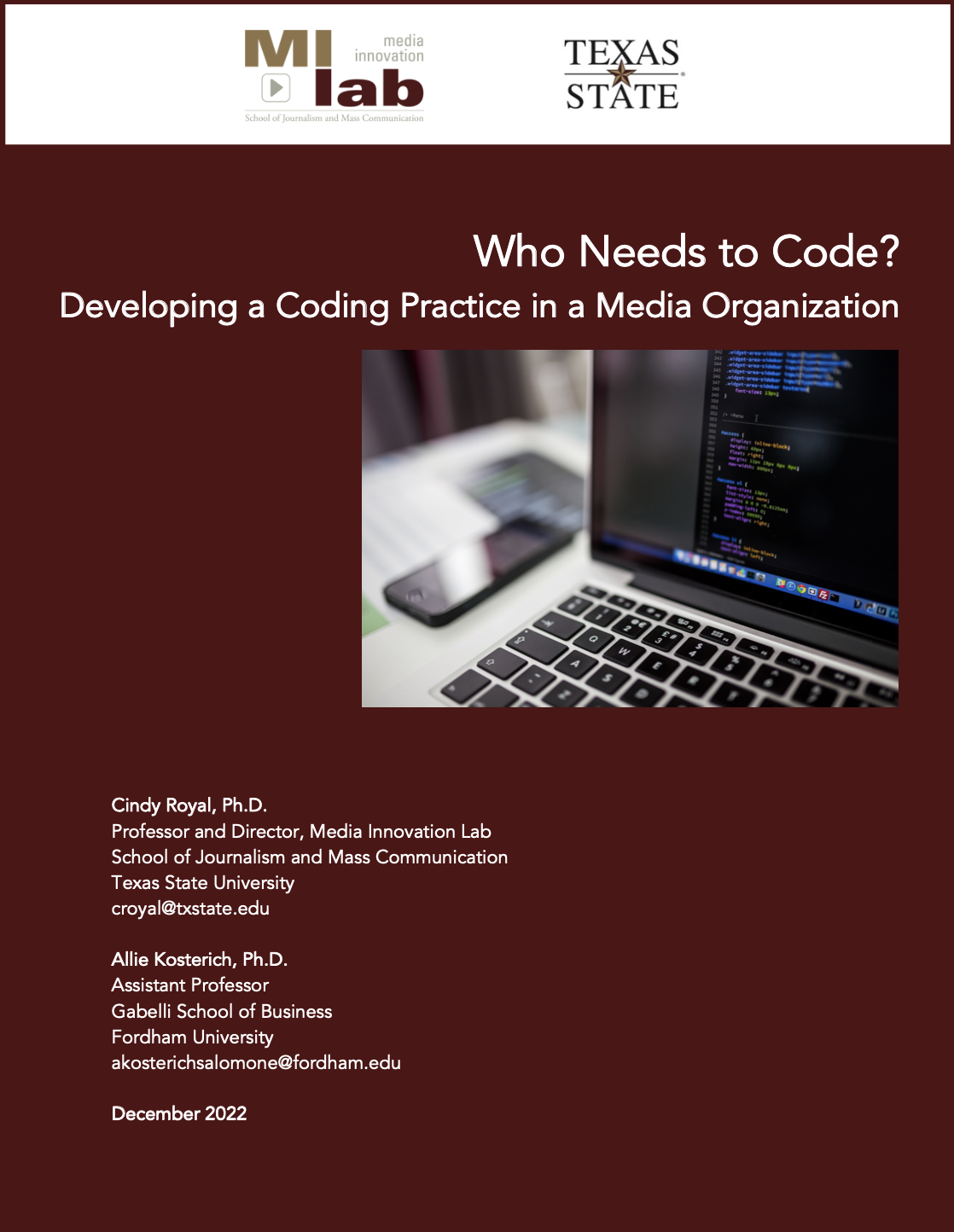Report

Who Needs to Code?
Developing a Coding Practice in a Media Organization
2022
Cindy Royal, Ph.D.
Professor and Director, Media Innovation Lab
School of Journalism and Mass Communication
Texas State University
croyal@txstate.edu
Allie Kosterich, Ph.D.
Assistant Professor
Gabelli School of Business
Fordham University
akosterichsalomone@fordham.edu
December 2022
Executive Summary
New roles have emerged in journalism that support the development of media products to meet audience needs through engagement, interactivity, multimedia and data. As the complexity of these products increases in terms of technology, presentation, data and content, new skills and competencies become essential to the future sustainability of media organizations. Computer programming, or what is commonly known as coding, is an area of skill in which media organizations need to better understand and develop a range of professional practices. This report, an exploratory study of news product managers and leaders, examines their insights into the desired or optimal ways in which coding competencies are practiced in media organizations. Results yield a range of coding practices across relevant position categories and indicate programming language choice and optimal competency levels. Comments from respondents provide insight into how these practices are influencing journalism production, culture and education. These trends become critical as media organizations seek future sustainability in an increasingly competitive, digital-product environment.
Report Highlights:
- A survey was sent to 37 professionals identified as product managers in media organizations derived from the membership of the News Product Alliance, with 19 responding. The survey assessed their insights on affected roles, programming language categories and competency levels of coding skills in media organizations.
- Roles in newsrooms affected by coding were identified as Data Journalists, News Application Developers, Other Web/Mobile Developer/Software Engineer, User Experience Designer, Graphic Designer, Social Media/Engagement Specialist, Product Manager and Product Director/Officer. The survey also sheds light on the coding competencies that traditional journalists and newsroom leadership could find useful.
- The survey assessed coding competencies across seven programming language categories: Markup; Frontend Frameworks; Frontend Interactive languages; Interactive Libraries or Frameworks; Server-side languages and/or Frameworks; Database Management languages or systems; and Data Analysis languages. Coding competency levels were assessed as Regular Practice, Limited Application and Conceptual Understanding.
- The most common language category expected across position types was for the Markup Languages of HTML/CSS. The second most common language category was for Frontend Interactive languages, like JavaScript.
- Those with the highest expectation of regular coding practice, or what we have termed “Super Coders,” were News App Developers, Other Developers and Data Journalists. News App Developers were rated highly for Regular Practice for Markup (89.5%) and Frontend Interactive languages (78.9%), as well as Frontend Libraries and Frameworks (78.9%), emphasizing their role in creating interfaces. Other Developers had high ratings for Regular Practice across most language categories. Data Journalists were rated highly for Regular Practice in the data-related languages of Database Management (68.4%) and Data Analysis (89.5%), reflecting the data-intensive nature of this role.
- Respondents indicated little to no expectation in Regular Practice for both Product Manager and Product Director/Officer roles. However, those in product positions were expected to have a Conceptual Understanding of Markup (Product Managers - 42.1%; Product Directors/Officers - 57.9%). Product Managers were rated slightly higher in terms of Limited Application of Markup skills (47.4%), with Product Directors/Officers rated 42.1% for Limited Application. Product professionals were expected by most respondents to have at least Conceptual Understanding within every language category.
- In comparing the means for both Product Managers and Product Leaders (Directors/Officers) with the ratings that the product professionals had of their own coding competencies, in all cases, respondents rated their own coding competency slightly higher than their expectations for these roles, but those differences were only significant in the Markup category.
- The Graphic Designer role had low ratings in Regular Practice knowledge of any of the languages, but more than half of the respondents rated Markup as Limited Application (36.8%) or Regular Practice (26.3%).
- In most of the languages categories, the UX Designer role was more like Product Manager and Product Director/Officer than the Graphic Designer role in that there is an expectation by many respondents that they have a Conceptual Understanding of the Frontend Interactive and Interactive Framework languages (61.1% in both language categories). The UX Designer and Graphic Designer roles had lower ratings for any level of understanding of the data-oriented languages.
- More than a third of respondents expected a Conceptual Understanding of Data Analysis Languages for Social Media/Engagement Specialists. 36.8% of respondents indicated that Other Journalists should have a Conceptual Understanding of Data Analysis languages, and 31.6% indicated Conceptual Understanding for Database Management. This indicates a growing expectation on the usage of data in these roles, although they may be used for different reasons.
- In both Other Journalist and Other Newsroom Leadership roles, a Conceptual Understanding of Markup was rated as optimal by most respondents, and 31.6% and 26.3% of the respondents rated a Limited Application competency for those two positions respectively. This indicates shifting expectations for coding competency for even traditional journalists and news leaders.
- This exploratory study sheds light on the need for a range of coding knowledge and expertise across positions in a media organization. The results highlight implications regarding organizational structure, hiring, professional development and media education.
 Download the Full Report - Who Needs to Code? Developing a Coding Practice in a Media Organization
Download the Full Report - Who Needs to Code? Developing a Coding Practice in a Media Organization
